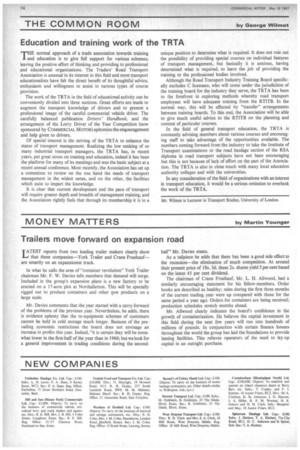Education and training work of the TRTA
Page 76

If you've noticed an error in this article please click here to report it so we can fix it.
HE normal approach of a trade association towards training .1. and education is to give full support for various schemes; leaving the positive effort of thinking and providing to professional and educational organizations. The Traders' Road Transport Association is unusual in its interest in this field and most transport educationalists have felt the direct benefit of its thoughtful advice, enthusiasm and willingness to assist in various types of course provision.
The work of the TRTA in the field of educational activity can be conveniently divided into three sections. Great efforts are made to augment the transport knowledge of drivers and to present a professional image of the careful .commercial vehicle driver. The carefully balanced publication Drivers' Handbook, and the arrangement of the Lorry Driver of the Year Competition (now sponsored by ColviktEnCIAL MOTOR) epitomize the encouragement and help given to drivers.
Of special interest is the striving of the TRTA to enhance the status of transport management. Realizing the low ranking of so many industrial transport managers, the TRTA has, in recent years, put great stress on training and education, indeed it has been the platform for many of its meetings and was the basic subject at a recent annual conference. Most recently, the Association has set up a committee to review on the one hand the needs of transport management in the widest sense, and on the other, the facilities which exist to impart the knowledge.
It is clear that current development and the pace of transport will require greater depth and breadth of management training, and the Association rightly feels that through its membership it is in a unique position to determine what is required. It does not rule out the possibility of providing special courses on individual features of transport management, but basically it is anxious, having determined what is required, to leave the job of providing the training to the professional bodies involved.
Although the Road Transport Industry Training Board specifically excludes C licensees, who will come under the jurisdiction of the training board for the industry they serve, the TRTA has been to the forefront in exploring methods whereby road transport employees will have adequate training from the RTITB. In the normal way, this will be effected by "transfer" arrangements between training boards. To this end, the Association will be able to give much useful advice to the RTITB on the planning and content of particular courses.
In the field of general transport education, the TRTA is constantly advising members about various courses and encouraging staff to take advantage of the opportunities available. The numbers coming forward from the industry to take the Institute of Transport examinations or the road haulage section of the RSA diploma in road transport subjects have not been encouraging but this is not because of lack of effort on the part of the Association. The TRTA is also in close touch with many local education authority colleges and with the universities.
In any consideration of the field of organizations with an interest in transport education, it would be a serious omission to overlook the work of the TRTA.
Mr. Wilmot is Lecturer in Transport Studies, University of London.




















































































































